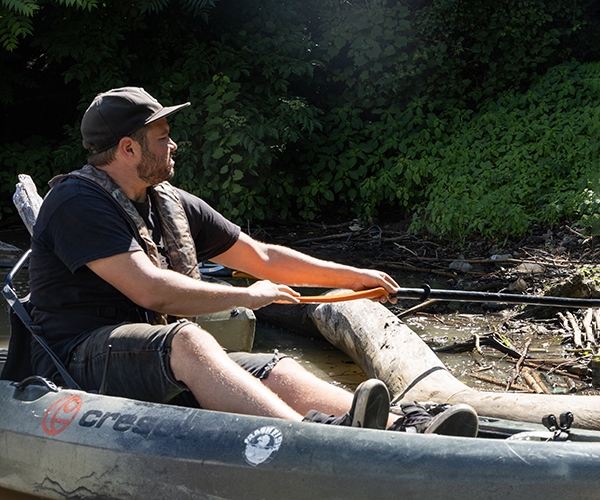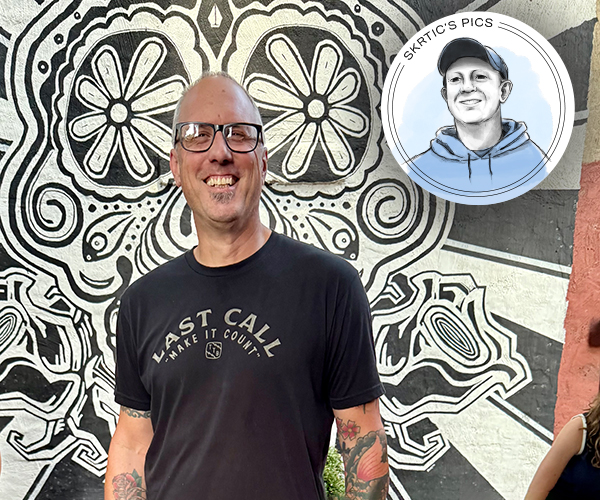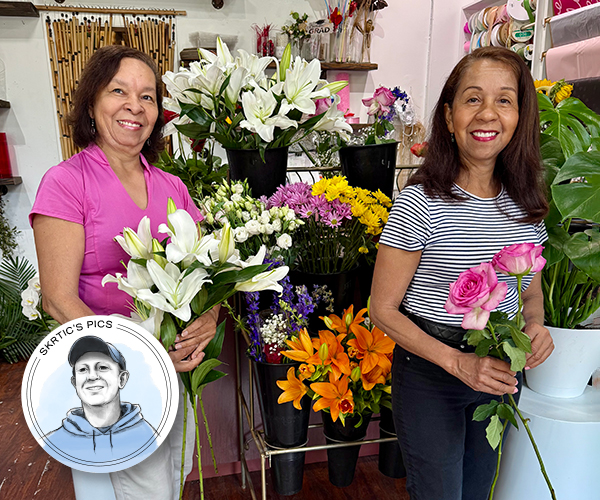"As you can see, it's an add-on, to an add-on, to an add-on," he says. "It's kind of been an organic growth here."
Most of the greenhouses at The Chef's Garden are connected by way of mazelike passageways with dirt floors and plastic walls. Waist-high plant beds are everywhere. It seems every square inch is used to grow something.
The hallways lead to larger rooms filled with well-manicured rows of specialty lettuces, seasonal vegetables such as radishes, almost 90 varieties of heirloom tomatoes, and trademarked microgreens and herbs — tiny versions of their full-grown counterparts. The basil collection, which grows seven-rows wide in a stand-alone greenhouse, includes nine varieties ranging from lemon to cinnamon to licorice.
The flavors born of these niche ingredients are why chefs throughout the world love Jones' Huron, Ohio-based farm. It has also made him a celebrity of sorts in food circles. He has appeared as a judge on the Food Network's Iron Chef America twice, most recently in May. The secret ingredient was cauliflower that was grown at The Chef's Garden.
But you may best know Jones because of his annual Food and Wine Celebration to benefit his company's nonprofit arm, Veggie U, which teaches fourth-graders how to eat healthy and grow produce. The annual benefit, where guests can sample culinary creations from many of Jones' customers, will take place this month on the Milan campus of the Culinary Vegetable Institute, a sort of country-farm-retreat-meets-spa-vacation for chefs. It's designed as a place where they can get away to host staff retreats and try out new dishes.
But The Chef's Garden is the cornerstone. Employees who work inside the greenhouses wear white lab coats and hairnets and use gloves when carefully handling the more than 600 varieties of vegetables, herbs and greens. A yellow, bar-coded tag identifies each plant bed. A detailed computer catalog houses the life story of each kind of plant that lives within the 300-acre, edible science experiment.
Inside the original greenhouse — a small space that resembles an oversized shed — one such experiment is under way. Rows of pea seedlings and popcorn shoots sleep in double-decker plant beds in the dark, damp space. The idea here, Jones explains, is to create a new environment for these plants to see if they can naturally create different colors to give chefs a better variety. "The size of this particular greenhouse was very scientifically arrived at," adds Jones, explaining that he sold his jeep for $650 in the '80s to pay for it. "This is how much lumber you got with $650."
That Jeep, six acres and a small farmhouse were all that was left of Jones' family farm nearly 30 years ago. His boisterous tone turns soft when he recalls the day the bank auctioned off the farm. The foreclosure was a result of high interest rates and the rise of commercial farming, topped off by a devastating hailstorm. Jones was 19 years old.
Along with his father and brother, Jones spent the following years rebuilding. The men sold produce at Cleveland farmers markets until a request for squash blossoms from a local chef changed everything. They fulfilled one request, then another. Five years later they were receiving too many chef orders to keep up. It was time to decide: Either sell solely to chefs, which were a mere 3 percent of their market at the time, or not at all.
Today, more than 500 chefs visit the farm and the Culinary Vegetable Institute just down the road each year. They place special orders. Some send rare seeds and entrust the growing to the Jones family. Chefs Wolfgang Puck, Charlie Trotter and Michael Symon are just a few of Jones' notable clients.
It's a cyclical relationship here between chef and producer. The shift in the family's business plan allowed The Chef's Garden to change the way they were farming, Jones says.
"Using pesticides and chemicals, it's what they taught you at the time," he explains. "This was the way you farmed. We decided we were going to grow without chemicals. We'd grow for flavor."
This model of sustainable agriculture — sometimes referred to as "beyond organic" — relies on growing crops slowly and naturally, without the use of chemicals or animal fertilizers. To ward off insects, seeds are sorted by weight to weed out weaker varieties. Jones also uses an old-fashioned farming technique to replenish the soil.
"We farm about 300 acres, but only about 100 are in production," Jones says. "Another 100 is sitting fallow, and then another 100 grows very specific components for compost, such as clover or buckwheat or barley or rye. We harvest it green and fold that into the compost."
A printed list that runs the length of a door inside one of the many greenhouse offices shows destinations for the day's shipments. Le Cirque at Bellagio in Las Vegas, Walt Disney World, The Ritz-Carlton in the Cayman Islands, a restaurant in the Netherlands and another in Hong Kong. Call The Chef's Garden by 10 a.m., and what's picked today could end up on a dinner plate in Los Angeles the next evening.
For a place with such a focus on local and sustainable foods, some may scoff at the idea of shipping products thousands of miles. Jones has an answer for that. Using FedEx, he sees his daily shipments just piggybacking on flights that are already going to be made, whether products from The Chef's Garden are on board or not.
"FedEx is going no place for us," Jones says. "They're already going, and we're just carpooling."
Life according to Farmer Lee Jones
It felt like your heart was being cut out and served to you. That's what it felt like to see our farm, land, the house we grew up in sold piece by piece in an auction.
There were five or six of us sitting around a card table, and we put it to a family vote. Were we going to keep doing farmers markets or sell to chefs? We went around the table and every one of us said "no" to the idea of selling only to chefs. When we got to my father, he pounded his fist on the table and said our votes counted for five, but his counted for six. We were going to sell to chefs.
Chefs have come a long way. Back then, the farmer and the chef were looked to be on the same level as the garbage man.
What we've learned from chefs is that at every single stage of a plant's life, it offers something unique to the plate — different texture, different flavor, different nuance.
Lemongrass. The way it's been used for hundreds of years is as a large stalk that you have to extract or infuse that essence from. Well, we've got a micro-lemongrass now that is amazing, so you may extract or infuse from the large stalk but then finish that off with a micro-lemongrass that ties the whole thing together. It's adding one more level.
I have Native American Indian corn that was sent to us in an Altoids can by a Native American Indian chief. We have dozens of stories like that where we are trying to preserve heirloom varieties.
Henry Ford made a statement once that, you can have any color car that you want as long as it's black. And his point was that he wanted to do one kind of car with four doors, one color, no radio. ... To do them all the same was the most efficient. In the United States that's sort of what our produce offerings were like.
The mainstream has gone organic. Now the people who are really hardcore are looking for a way to differentiate again. Is it sustainable? Is it beyond organic? We sometimes say we are beyond organic. The importance is reconnecting the producers and users.
It's our personal belief that there's a direct correlation between the health of our nation, or the lack thereof, and the way that we grow products in the United States commercially.
As you can see, I am constantly eating. I am very, very seasonally sensitive, and I encourage our chefs to be. When asparagus is in season, it should be eaten three times a day, every day.
I can cook. I'm not an expert cook. I don't really like to overstep my bounds.
I felt like I had absolutely no qualifications whatsoever to be a judge on Iron Chef. It was very intimidating because they are my peers and mentors and people that I very much respect. It was a huge honor, and it was a blast. And I would do it again if asked.
They explained to me between the first and second time I did it that judging food is like wine. You either know that you like it or know that you don't.
It's our contention that God designed a system that's far superior to anything that we can think of chemically or synthetically. Different types of plants accept different kinds of energy through the sun.
Veggie U starts to open kids' minds to the fact that there's a world outside of a McDonald's french fry, and it teaches them how to read a food label. It's something to teach them that vegetables don't come from a plastic bag or a can or a produce section.
Kids will try anything. They may not like it all, but they'll try it.
My dad has a saying that we have to continue to make mistakes faster than the competition.
Listen to your parents.
There were five or six of us sitting around a card table, and we put it to a family vote. Were we going to keep doing farmers markets or sell to chefs? We went around the table and every one of us said "no" to the idea of selling only to chefs. When we got to my father, he pounded his fist on the table and said our votes counted for five, but his counted for six. We were going to sell to chefs.
Chefs have come a long way. Back then, the farmer and the chef were looked to be on the same level as the garbage man.
What we've learned from chefs is that at every single stage of a plant's life, it offers something unique to the plate — different texture, different flavor, different nuance.
Lemongrass. The way it's been used for hundreds of years is as a large stalk that you have to extract or infuse that essence from. Well, we've got a micro-lemongrass now that is amazing, so you may extract or infuse from the large stalk but then finish that off with a micro-lemongrass that ties the whole thing together. It's adding one more level.
I have Native American Indian corn that was sent to us in an Altoids can by a Native American Indian chief. We have dozens of stories like that where we are trying to preserve heirloom varieties.
Henry Ford made a statement once that, you can have any color car that you want as long as it's black. And his point was that he wanted to do one kind of car with four doors, one color, no radio. ... To do them all the same was the most efficient. In the United States that's sort of what our produce offerings were like.
The mainstream has gone organic. Now the people who are really hardcore are looking for a way to differentiate again. Is it sustainable? Is it beyond organic? We sometimes say we are beyond organic. The importance is reconnecting the producers and users.
It's our personal belief that there's a direct correlation between the health of our nation, or the lack thereof, and the way that we grow products in the United States commercially.
As you can see, I am constantly eating. I am very, very seasonally sensitive, and I encourage our chefs to be. When asparagus is in season, it should be eaten three times a day, every day.
I can cook. I'm not an expert cook. I don't really like to overstep my bounds.
I felt like I had absolutely no qualifications whatsoever to be a judge on Iron Chef. It was very intimidating because they are my peers and mentors and people that I very much respect. It was a huge honor, and it was a blast. And I would do it again if asked.
They explained to me between the first and second time I did it that judging food is like wine. You either know that you like it or know that you don't.
It's our contention that God designed a system that's far superior to anything that we can think of chemically or synthetically. Different types of plants accept different kinds of energy through the sun.
Veggie U starts to open kids' minds to the fact that there's a world outside of a McDonald's french fry, and it teaches them how to read a food label. It's something to teach them that vegetables don't come from a plastic bag or a can or a produce section.
Kids will try anything. They may not like it all, but they'll try it.
My dad has a saying that we have to continue to make mistakes faster than the competition.
Listen to your parents.



